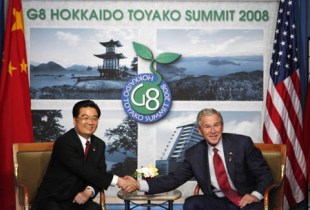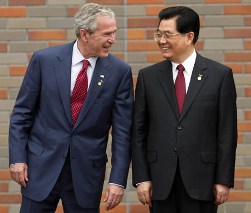
Wednesday, July 9 brought an outreach session during July 7-9, facilitated by the Group of Eight (G8 ) Summit in Tokayo, Japan. The outreach session was convened at the Windsor Hotel, where the G8 leaders (Britain, Canada, France, Germany, Italy, Japan, Russia, and US) invited leaders from key developing nations to weigh in on energy security and climate change.
As in invitee, China took the opportunity to submit a four-point proposal that would aim to strengthen the global economy.
Taking a step back, a more pressing issue for overall summit members is the question of what to do with the G5 – the five key developing nations – or, “growing dynamos” – that represent nearly 3 billion people: China, India, Brazil, South Africa and Mexico. PRC's President Hu stands by the importance of participation by G5 members, saying that the combined make-up of the countries represented by G8+G5 = 60 percent of the world's total population = three-fourths of the world's total economic power.
Hu's statement is delivered with poise, equal parts a) nodding to key G8 leadership reluctant to acknowledge China's power in a global forum; and b) compensating for its recently unfavorable reputation by rising to carve a path for its fellow G5ers. It is rumored that leading up to the summit, Japan was reluctant to pursue dialogue with the G5 “for fear of too openly acknowledging the power of China,” resulting in the dilution of the summit, through the shortening of its duration and extending invitation to other major non-G8 contries to neutralize discussions: Indonesia, South Korea, and Australia.
 One particular article on the G8 Tokayo 2008 blog discusses China's role in the G8, and says that China has “hedged its options toward the G8, and emphasized meeting rather than joining, ” going on to discuss that although its priority reaches for international acceptance as a peaceful but key player with market-economy status, it must do so on its own terms . . . not as a sole nation joining the ranks of the other G8s, but with its G5 counterparts and ‘developing’ allies. As China continues to strategize its entry into more visible, large-scale forums, it must be sensitive to one pivotal consideration:
One particular article on the G8 Tokayo 2008 blog discusses China's role in the G8, and says that China has “hedged its options toward the G8, and emphasized meeting rather than joining, ” going on to discuss that although its priority reaches for international acceptance as a peaceful but key player with market-economy status, it must do so on its own terms . . . not as a sole nation joining the ranks of the other G8s, but with its G5 counterparts and ‘developing’ allies. As China continues to strategize its entry into more visible, large-scale forums, it must be sensitive to one pivotal consideration:
“. . . as China's international profile grows, so does pressure on Beijing to demonstrate that it is willing to act not only as a force for world peace and stability, but also as a responsible international stakeholder.”
The reason why Hu's proposal is centered on qualifying successful coordination mechanisms that will best engage developing nations on emerging issues is become clear.
Other G5s seem to share the opinion that they aren't getting enough time at the table with their G8 counterparts. Lourdes Aranda, Mexico's deputy foreign minister and G5 coordinator believes that in addition to limited talk time, the 5 get are restricted to discussing platforms where "developed countries have basically set the agenda." Representative of the enthused spirit of G5, she advocates its wider stance, as its vast impoverished populations could play a stabilizing role.
However rudimentary, the benefts of this Heiligendamm process cannot be overlooked. This channel alone has supported the gaining of G5 countries’ talking ground by providing: